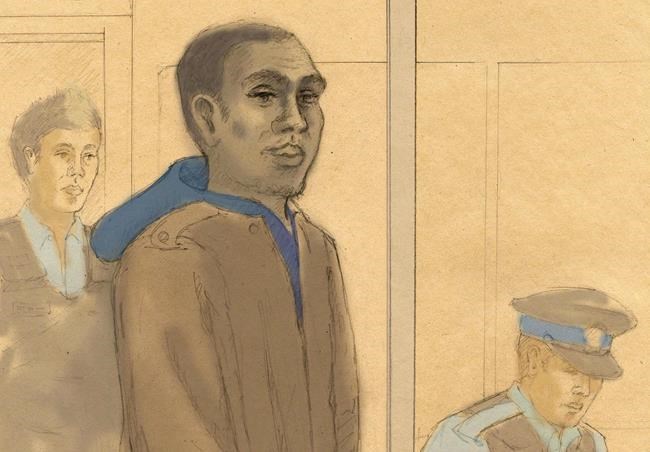TORONTO — Ontario's top court has upheld the life sentences for a man who opened fire in the food court of Toronto's crowded Eaton Centre mall in 2012, a shooting that killed two men and injured several other people, including a 13-year-old boy who was shot in the head.
In a unanimous decision released Wednesday, the Court of Appeal for Ontario found there was "no basis for interfering" in the sentences handed to Christopher Husbands in 2019, which were to be served at the same time and came with seven years of parole ineligibility.
The trial judge, Superior Court Justice Brian O'Marra, imposed the sentences he considered appropriate within the boundaries of the law "after carefully assessing all mitigating and aggravating circumstances and taking all relevant evidence into account," Associate Chief Justice Michal Fairburn wrote on behalf of the three-member panel.
"There is no failure to consider a relevant factor. There is no erroneous consideration of aggravating or mitigating circumstances. The sentence is not demonstrably unfit."
The ruling came after an appeal following Husbands' second trial in the case. In the first trial, he was found guilty of two counts of second-degree murder, as well as other charges, but he successfully appealed and a new trial was ordered, in which he was found guilty of manslaughter.
Husbands' lawyer, Dirk Derstine, said his client was disappointed with Wednesday's outcome and would take time to process the news in order to move forward with as much optimism as possible.
Since the jury found Husbands did not have the intent to kill – in finding him guilty of manslaughter – a life sentence is "an extremely significant sentence," Derstine said.
While Husbands was eligible to apply for parole at the time of his sentencing, he has not yet done so, the lawyer added.
Husbands was found guilty in 2019 of two counts of manslaughter in the deaths of Ahmed Hassan and Nixon Nirmalendran. Hassan, 24, died at the scene after the June 2, 2012, shooting, while Nirmalendran, 22, died in hospital nine days later.
Husbands was also found guilty of five counts of aggravated assault, one of criminal negligence causing bodily harm, and one of intentionally discharging a firearm while being reckless as to the life or safety of another person.
The trial judge also imposed several fixed-term sentences on these counts, all to be served at the same time. The longest was 14 years for the aggravated assault of a 13-year-old boy, Connor Stevenson, who was shot in the head. Husbands was credited 10 years towards those sentences for the time he'd already spent in custody.
In determining the parole ineligibility for the life sentences, O'Marra said he would have extended it from seven years to the 10-year maximum for manslaughter, but decided not to in recognition of the harsh conditions in which Husbands had been jailed, including 669 days in solitary confinement.
Husbands's lawyers had appealed the life sentences on several grounds, including that they were demonstrably unfit and that the trial judge had failed to properly apply the legal framework for considering social context such as anti-Black racism.
They sought to have the life sentences thrown out and replaced with a fixed sentence of 15 years.
At trial, jurors heard Husbands, who was 23 at the time, was at the Eaton Centre with his girlfriend shortly before 6:30 p.m. when he spotted Nirmalendran and his brother Nisan Nirmalendran -- two men he said had been part of a group that stabbed and left him for dead a few months earlier.
Husbands pulled out a fully loaded semi-automatic handgun that he said he was holding for another man and opened fire in the food court, which held more than 700 people at the time, court heard. He fired 14 shots and then escaped, only to turn himself in a few days later, court heard.
The trial heard Husbands had symptoms of post-traumatic stress disorder as a result of the stabbing in early 2012. The defence urged jurors to find him not criminally responsible on grounds that he was in a dissociative state at the time of the shooting.
The jury rejected that defence but found Husbands, who was being tried for second-degree murder, guilty of the lesser charge of manslaughter.
The Crown initially sought to challenge the acquittals on second-degree murder, and the defence the convictions, but both dropped those appeals. The defence appeal proceeded on the sentences alone.
This report by The Canadian Press was first published Feb. 28, 2024.
Paola Loriggio, The Canadian Press



